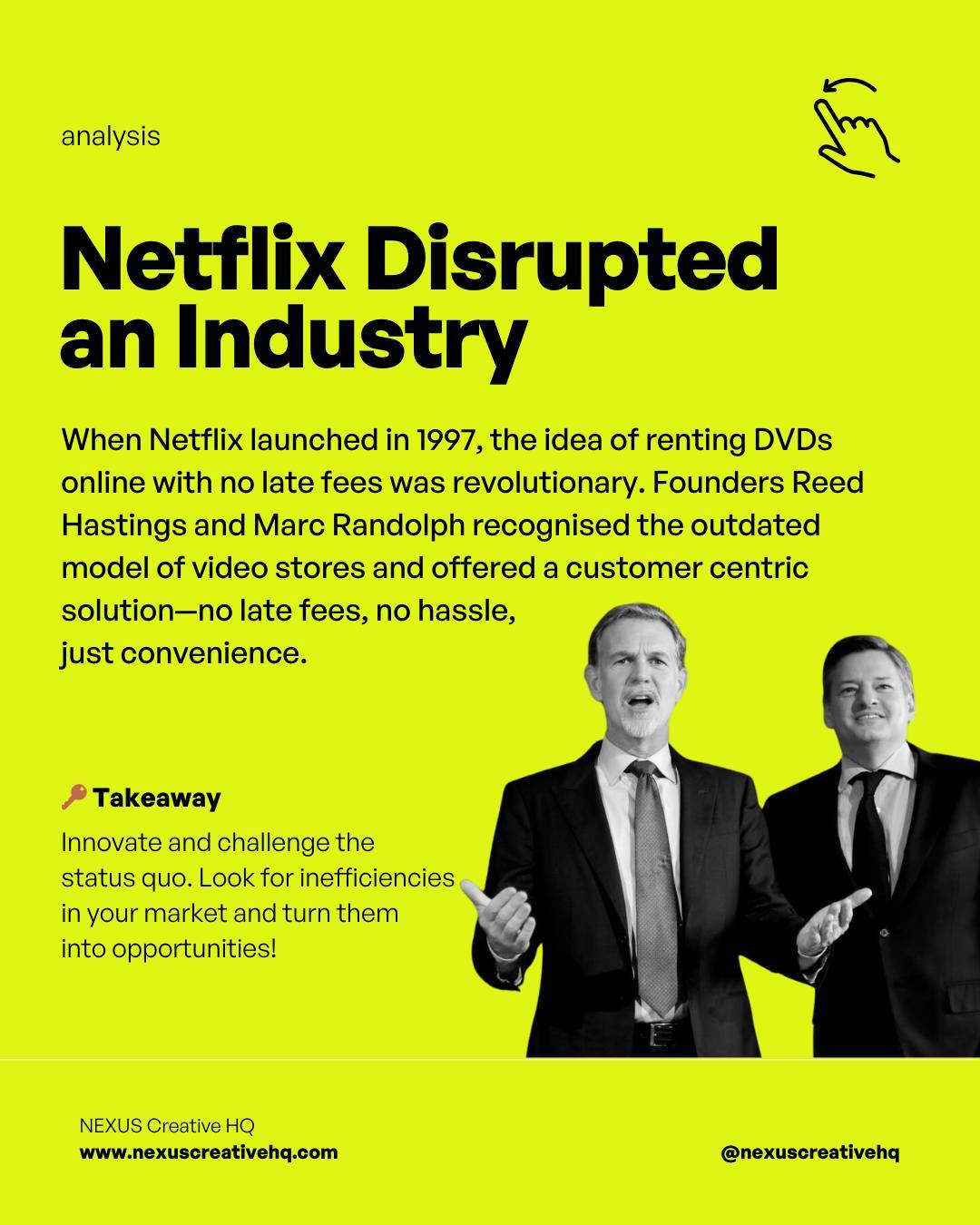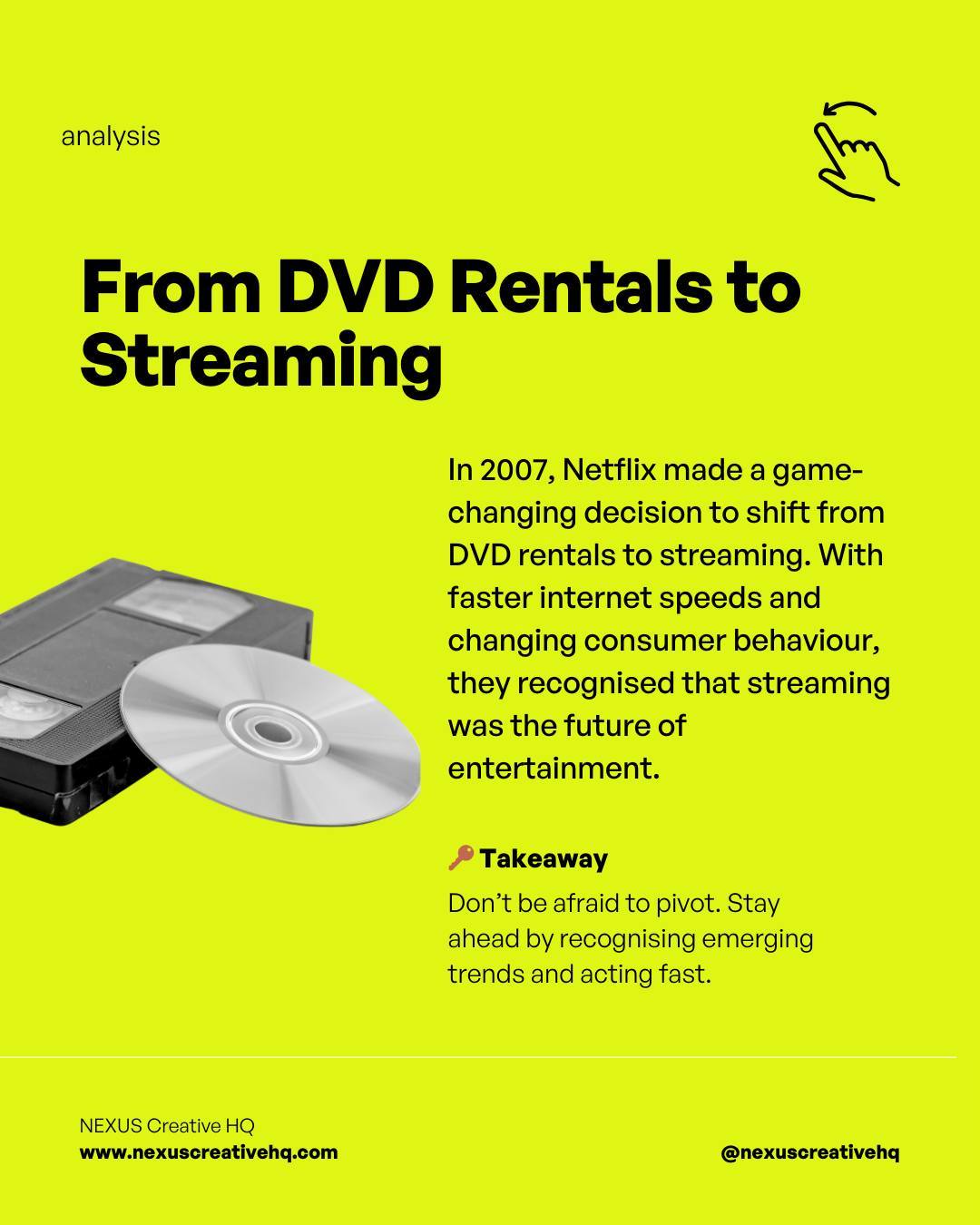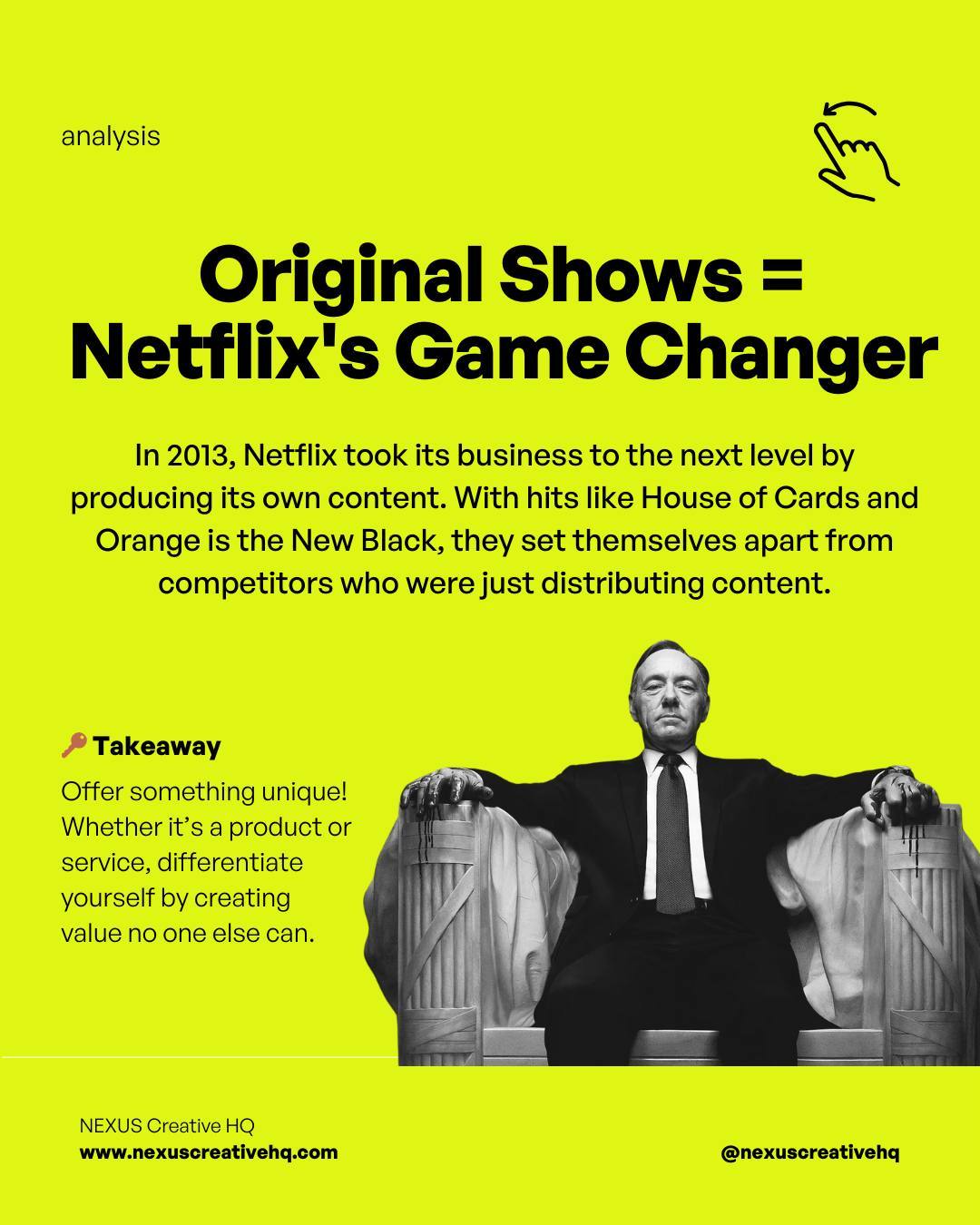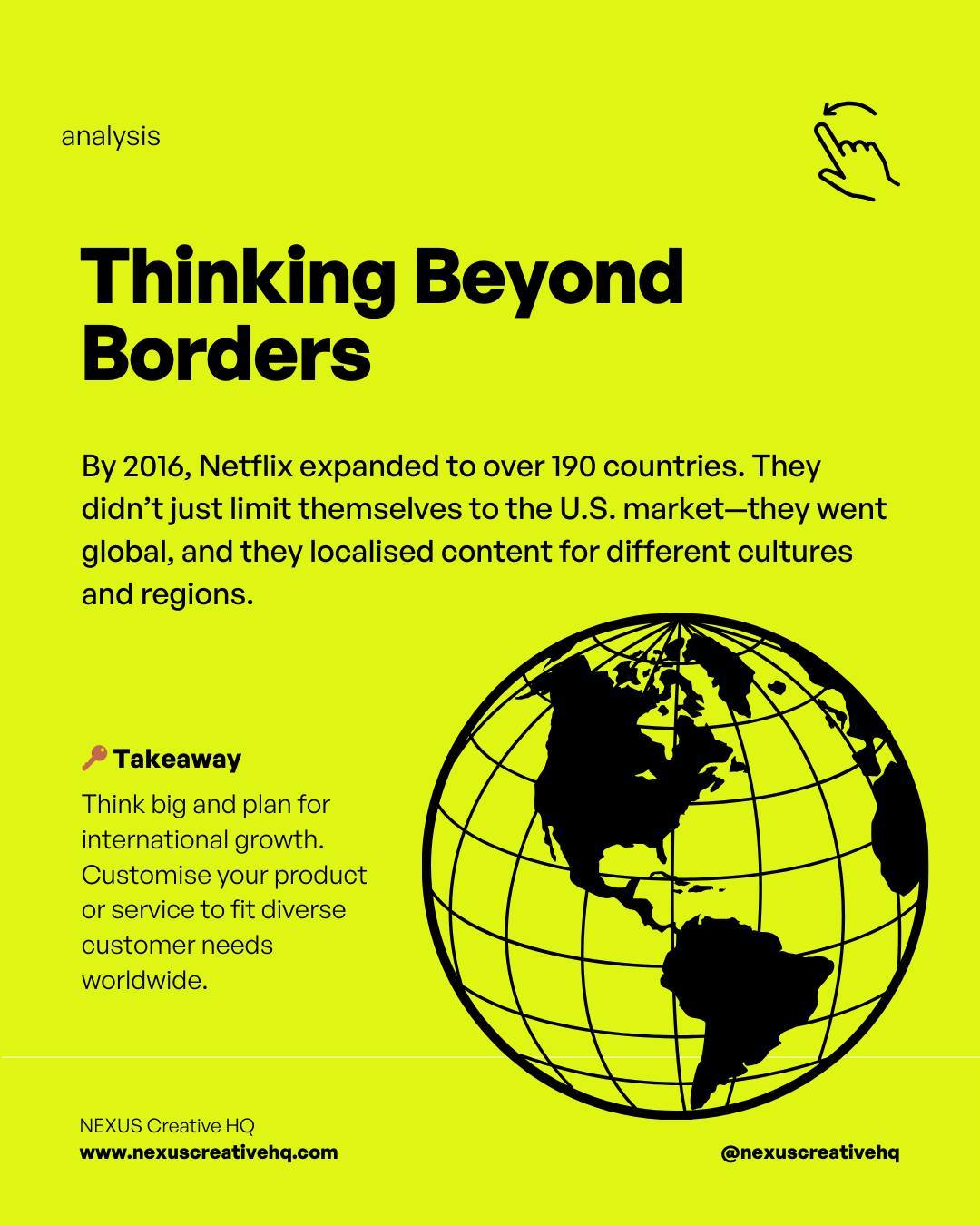Reverse Engineering Netflix: Key Strategies for Startup Success
Netflix, once a humble DVD rental service, has evolved into one of the most successful streaming platforms in the world. Its growth from a small startup in 1997 to a multi-billion dollar global brand is nothing short of remarkable. But what makes Netflix such a great business? And how can startup founders replicate some of the strategies that have made Netflix a success? Let’s take a deep dive into the evolution of Netflix, highlighting key strategies that have shaped its rise, and extract actionable insights that founders can apply to their own businesses.
1. Embrace Innovation Early: The Birth of Netflix
When Reed Hastings and Marc Randolph founded Netflix in 1997, the idea of an online DVD rental service was groundbreaking. At the time, Blockbuster was dominating the video rental industry, with physical stores in nearly every neighborhood. However, Netflix saw an opportunity to innovate the rental model by removing late fees and offering the convenience of online ordering and home delivery.
Key Takeaway for Founders:
-
Identify and challenge traditional business models. Netflix disrupted a well-established industry by rethinking the way people rented movies. Look for areas in your industry where inefficiencies exist, and think about how you can offer a better experience for consumers.
-
Stay customer-centric. From day one, Netflix focused on delivering value to its users. Always listen to your customers and prioritize their needs.
2. Pivot to Streaming: A Bold Move into New Territory
In the mid-2000s, as internet speeds improved and broadband became more accessible, Netflix identified another opportunity for disruption. In 2007, the company pivoted from DVD rentals to streaming movies and TV shows directly to consumers. This was a risky move, but Netflix had the foresight to recognize the growing trend of digital content consumption.
Key Takeaway for Founders:
-
Be willing to pivot. Sometimes, staying on the same path can hold back a company’s growth. Netflix didn’t hesitate to embrace new technology, even if it meant taking risks. As a startup, don’t be afraid to pivot if you see a better opportunity emerging.
-
Capitalize on emerging trends. Always be on the lookout for new trends in technology and consumer behavior. By positioning yourself early in a growing industry, you can gain a competitive edge.
3. Original Content: Reinventing the Entertainment Industry
In 2013, Netflix made a game-changing move: it started producing its own original content, beginning with the hit series House of Cards. This marked a shift in the entertainment landscape, with Netflix becoming a powerhouse in both content creation and distribution. By 2021, Netflix had invested billions of dollars in original programming, which not only differentiated it from competitors but also made it indispensable to subscribers.
Key Takeaway for Founders:
-
Create unique value propositions. Original content is a major differentiator for Netflix. For startups, creating something unique or offering a service/product that can't be easily replicated by competitors will help you stand out.
-
Invest in quality. Netflix didn't just produce content — it made sure that the content was high quality. Whether it’s your product, service, or customer experience, ensure that everything you offer is of top-tier quality.
4. Global Expansion: Thinking Beyond Borders
Netflix’s global expansion strategy is one of the most ambitious in tech history. By 2016, Netflix was available in over 190 countries. This aggressive push into international markets gave the company access to new audiences and revenue streams. Netflix understood that to sustain growth, it needed to think globally and adapt its content to cater to diverse cultures.
Key Takeaway for Founders:
-
Think global from the start. Netflix didn’t limit itself to the U.S. market; it scaled its business globally. Whether you’re offering a physical product or a digital service, consider how your business could scale internationally and adapt to different markets.
-
Localize your approach. While Netflix offered global streaming, it also tailored content to local tastes, producing original series in multiple languages. Similarly, startups should be open to customizing their offerings to meet the preferences of different demographics.
5. Data-Driven Decisions: The Power of Analytics
Netflix is known for its extensive use of data to drive decision-making. The company leverages data not only to recommend content but also to guide decisions on what shows or movies to produce. Netflix has millions of data points from user behavior, and it uses this information to continuously refine its offerings and improve customer satisfaction.
Key Takeaway for Founders:
-
Leverage data for better decisions. Whether it’s customer feedback, website analytics, or product usage data, use all available insights to refine your business strategy. Startups that use data effectively can make smarter decisions and anticipate customer needs before they arise.
-
A/B testing and iteration. Netflix continuously tests its algorithms, marketing tactics, and even thumbnail designs to see what resonates with viewers. Startups should experiment with various approaches, test what works, and refine their tactics over time.
6. Subscription Model: Building a Recurring Revenue Stream
One of the keys to Netflix’s financial success is its subscription-based revenue model. By offering a low-cost, recurring subscription fee, Netflix created a steady revenue stream that allowed it to invest heavily in content and technology. The subscription model is scalable and predictable, providing Netflix with the financial stability needed to pursue its ambitious goals.
Key Takeaway for Founders:
-
Build recurring revenue streams. Whether it's through subscriptions, memberships, or repeat purchases, developing a business model that generates consistent and predictable revenue is crucial for long-term success.
-
Focus on customer retention. Subscription models depend on keeping customers happy and engaged. Make sure you’re delivering value regularly to maintain a loyal customer base.
7. Adapting to Competition: Staying Ahead in a Crowded Market
Despite Netflix's dominant position, it has faced stiff competition from companies like Amazon Prime Video, Disney+, and Hulu. However, Netflix continues to stay ahead by constantly innovating. Whether through strategic partnerships, pricing adjustments, or the development of new features, Netflix has shown an ability to adapt and thrive even in a competitive landscape.
Key Takeaway for Founders:
-
Stay agile in the face of competition. Don’t rest on your laurels, even if you’re in a leading position. Monitor your competitors, understand their strengths, and be ready to adapt or introduce new features that enhance your value proposition.
-
Differentiate constantly. As new competitors enter your market, you need to differentiate yourself more than ever. Netflix’s investment in original content, international expansion, and data-driven strategies allowed it to stay ahead, and you should continually innovate to do the same.
Final Thoughts: Key Takeaways for Startup Founders
Netflix’s journey from DVD rentals to streaming giant is a testament to the power of innovation, strategic pivoting, and customer-centric thinking. Here are the core lessons startups can apply:
-
Disrupt traditional business models and always stay customer-focused.
-
Be prepared to pivot when new opportunities arise.
-
Create unique value and invest in quality.
-
Think globally and localize when needed.
-
Use data to guide decision-making and continuously test your ideas.
-
Build sustainable revenue models that ensure growth.
-
Stay competitive by adapting quickly and differentiating yourself.
Netflix’s success didn’t happen overnight, and it’s not just about technology — it’s about understanding the market, embracing change, and continually providing value. By applying these principles, startups can build businesses that stand the test of time.






